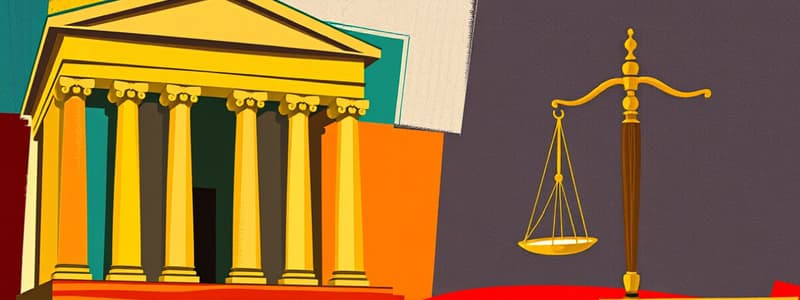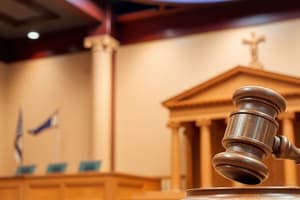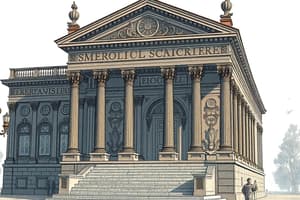Podcast
Questions and Answers
The only court the constitution creates is the ________.
The only court the constitution creates is the ________.
Supreme Court
The two court systems in the United States are __________________.
The two court systems in the United States are __________________.
the federal court system and state court system
Two kinds of legal cases are ____________.
Two kinds of legal cases are ____________.
civil and criminal
The job of the Court of Appeals is __________.
The job of the Court of Appeals is __________.
It's difficult to take a case to the Supreme Court ___________.
It's difficult to take a case to the Supreme Court ___________.
If you lose a case in the trial court, you can __________________.
If you lose a case in the trial court, you can __________________.
If an appellate court affirms a case, it means ________________.
If an appellate court affirms a case, it means ________________.
If a law is unconstitutional, the Supreme Court can _______.
If a law is unconstitutional, the Supreme Court can _______.
Evidence is used for ________________.
Evidence is used for ________________.
A trial with no jury is called a ___________________.
A trial with no jury is called a ___________________.
List these in the right order: The Court of Appeals remands the case, a new trial begins, the first verdict is appealed.
List these in the right order: The Court of Appeals remands the case, a new trial begins, the first verdict is appealed.
List these in the right order: Trial is held in the District Court, The Supreme Court agrees to hear the case, an appeal is made to the Court of Appeals.
List these in the right order: Trial is held in the District Court, The Supreme Court agrees to hear the case, an appeal is made to the Court of Appeals.
List these in the right order: The Supreme Court strikes down the law, Supreme Court hears a case about the law, Congress passes a law.
List these in the right order: The Supreme Court strikes down the law, Supreme Court hears a case about the law, Congress passes a law.
Trial Court:
Trial Court:
Both the Trial Court and the Appellate Court:
Both the Trial Court and the Appellate Court:
Appellate Court:
Appellate Court:
How many court systems are in the US?
How many court systems are in the US?
Group of people who decide a case after hearing the evidence.
Group of people who decide a case after hearing the evidence.
When an appellate court upholds a verdict...
When an appellate court upholds a verdict...
What appellate judges look for when they review a case...
What appellate judges look for when they review a case...
Number of justices on the Supreme Court...
Number of justices on the Supreme Court...
When an appellate court rejects a verdict...
When an appellate court rejects a verdict...
Type of court that reviews the trial court's decision...
Type of court that reviews the trial court's decision...
The Supreme Court's power to decide what is constitutional...
The Supreme Court's power to decide what is constitutional...
When there is more than one judge, the group of judges is called...
When there is more than one judge, the group of judges is called...
The lowest court in the federal system...
The lowest court in the federal system...
Choosing between the federal or state court system depends on the _________ involved in the case.
Choosing between the federal or state court system depends on the _________ involved in the case.
The first court to hear a case....
The first court to hear a case....
When an appellate court sends a case back to the trial court...
When an appellate court sends a case back to the trial court...
Type of case relating to people's rights...
Type of case relating to people's rights...
Type of case about someone accused of committing a crime...
Type of case about someone accused of committing a crime...
Asking an appellate court to review a case is called...
Asking an appellate court to review a case is called...
Congress creating other courts is an example of what?
Congress creating other courts is an example of what?
Flashcards are hidden until you start studying
Study Notes
Judicial Branch Overview
- The Supreme Court is the only court established by the Constitution.
- There are two court systems in the United States: federal court system and state court system.
Types of Cases
- Legal cases fall into two categories: civil and criminal.
- Civil cases relate to rights and disputes between individuals, while criminal cases involve accusations of crimes.
Court Functions
- The Court of Appeals reviews cases from the District Court to ensure legal correctness.
- Appellate courts can affirm a verdict, meaning the original decision stands, or reverse it, which overturns the initial ruling.
- If a case is deemed unconstitutional, the Supreme Court has the authority to outlaw the law.
Trial and Appeal Processes
- A trial with no jury is termed a bench trial.
- If a trial verdict is lost, one can appeal to a higher court for review.
- The order of operations in appeals: a verdict is appealed, the Court of Appeals remands the case, and a new trial commences.
Court Structures
- Trial Courts handle cases for the first time and may involve jury trials.
- Appellate Courts do not hear cases for the first time and usually operate with three judges reviewing previous verdicts for errors.
Composition and Jurisdiction
- The Supreme Court is composed of nine justices.
- The lowest court in the federal system is the district court.
- The choice between federal or state court systems hinges on the relevant laws involved.
Definitions and Legal Terms
- A jury is the group of people tasked with deciding a case based on evidence.
- Judicial review allows the Supreme Court to interpret constitutional validity.
- "Remand" refers to sending a case back to the trial court after review.
Legislative Powers
- Congress’s ability to create additional courts is an example of the elastic clause, which grants flexibility in legislative powers.
Summary
- Understanding the hierarchy of courts and the types of cases is crucial in navigating the judicial system.
- Familiarity with key terms such as appeal, affirm, reverse, and remand is essential for comprehension of legal processes.
Studying That Suits You
Use AI to generate personalized quizzes and flashcards to suit your learning preferences.



